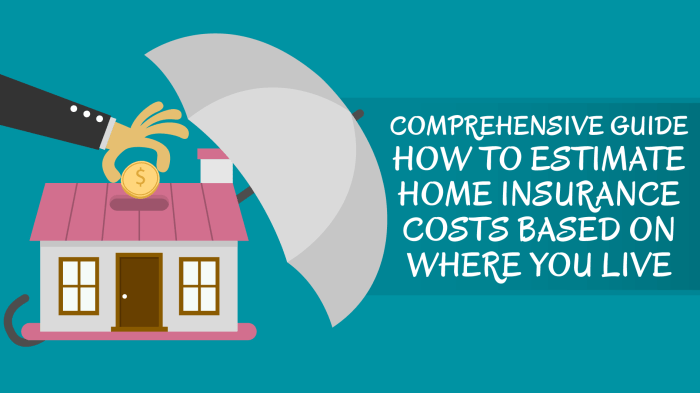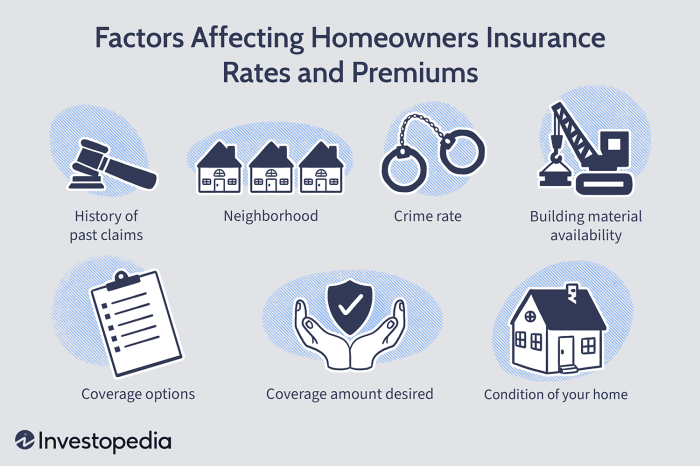In today’s economic climate, it’s more important than ever to find ways to save money. One area where you can often trim your expenses is your home insurance. By following these tips, you can keep your home insurance costs affordable without sacrificing coverage.
From understanding your coverage needs to bundling policies and taking advantage of discounts, this comprehensive guide will provide you with valuable insights and actionable steps to help you secure cost-effective home insurance while maintaining adequate protection for your property.
Understanding Home Insurance Coverage

Home insurance is a crucial aspect of safeguarding your property and assets. It provides financial protection against various risks, ensuring peace of mind. To make informed decisions and manage your home insurance costs effectively, it’s essential to understand the different types of coverage available, your coverage limits and exclusions, and how to tailor your policy to meet your specific needs.
Types of Home Insurance Coverage
Home insurance policies typically offer a range of coverage options to protect your property and personal belongings. These may include:
- Dwelling Coverage: Protects the physical structure of your home, including its attached structures like garages and decks.
- Personal Property Coverage: Covers your personal belongings inside your home, such as furniture, appliances, electronics, and clothing.
- Liability Coverage: Provides protection against legal claims arising from injuries or property damage caused by you or your family members to others.
- Additional Living Expenses Coverage: Covers temporary living expenses if your home becomes uninhabitable due to a covered loss.
- Other Structures Coverage: Protects detached structures on your property, such as sheds, fences, and gazebos.
Understanding Coverage Limits and Exclusions
When selecting a home insurance policy, it’s crucial to understand your coverage limits and exclusions. Coverage limits determine the maximum amount your insurance company will pay for a covered loss. Exclusions specify events or circumstances that are not covered under the policy.
Carefully review your policy to ensure you have adequate coverage for your needs and understand what is and is not covered.
Tailoring Your Coverage to Your Needs
To ensure you have the right coverage at an affordable cost, consider the following tips:
- Assess Your Needs: Evaluate your home’s value, personal property, and potential risks to determine the appropriate coverage levels.
- Consider Deductible Options: A higher deductible can lower your premiums, but it means you’ll pay more out of pocket if you file a claim.
- Review Your Policy Regularly: Your needs and circumstances may change over time, so periodically review your policy to ensure it still meets your requirements.
- Explore Discounts: Many insurance companies offer discounts for installing security systems, maintaining a good credit score, or bundling your home and auto insurance.
- Work with an Insurance Agent: Consult with an experienced insurance agent who can help you understand your coverage options, assess your risks, and tailor a policy that suits your specific needs.
Evaluating Insurance Companies

Choosing the right home insurance company is crucial for securing affordable rates and reliable coverage. Consider these factors when selecting an insurer:
- Financial Stability: Opt for companies with a strong financial rating from reputable agencies like AM Best, Standard & Poor’s, or Moody’s. This ensures their ability to pay claims and remain solvent.
- Customer Service: Research the company’s reputation for customer service. Read reviews and testimonials to gauge their responsiveness, efficiency, and willingness to assist policyholders during claims.
- Claims Handling: Inquire about the company’s claims handling process. Find out how long it typically takes to process and settle claims, and whether they have a dedicated claims department or outsource this function.
- Coverage Options: Ensure the company offers the coverage options you need, including dwelling coverage, personal property coverage, liability coverage, and additional riders if necessary.
- Discounts and Benefits: Ask about available discounts and benefits, such as bundling policies, loyalty discounts, or discounts for installing safety devices like smoke detectors or security systems.
Comparing Quotes from Multiple Insurers
Obtaining quotes from multiple insurance companies is essential for finding the best rates. Here’s why:
- Rate Variations: Home insurance rates can vary significantly between companies, even for similar coverage. Comparing quotes allows you to identify the most competitive rates and save money.
- Coverage Differences: Different insurers may offer varying levels of coverage or additional riders. Comparing quotes helps you assess the coverage options and select the policy that best meets your needs.
- Negotiation Leverage: Having multiple quotes in hand gives you leverage when negotiating with insurance companies. You can use one quote as a bargaining chip to obtain a better rate from another insurer.
Negotiating with Insurance Companies
Negotiating with insurance companies can help you secure better rates. Here are some tips:
- Be Prepared: Gather all relevant information, including your home’s value, square footage, construction materials, and any safety features. This information will help you negotiate effectively.
- Ask for Discounts: Inquire about available discounts and ask if there are any additional discounts you may be eligible for, such as bundling policies or installing safety devices.
- Compare Quotes: Use quotes from other insurers as leverage. Let the insurance company know you have better offers and see if they are willing to match or beat the rates.
- Be Polite and Persistent: Maintain a polite and respectful attitude during negotiations. Be persistent and don’t be afraid to ask for a better rate. Sometimes, insurance companies may offer a lower rate if you ask.
Increasing Your Deductible

Increasing your deductible is a simple way to lower your home insurance premiums. A deductible is the amount you pay out-of-pocket before your insurance coverage kicks in. The higher your deductible, the lower your premiums will be. This is because the insurance company is taking on less risk by agreeing to pay for damages only after you have paid a certain amount.
For example, if you have a $500 deductible and you file a claim for $1,000 in damages, you will pay the first $500 and the insurance company will pay the remaining $500. If you have a $1,000 deductible, you will pay the first $1,000 and the insurance company will pay the remaining $0. As you can see, increasing your deductible can save you money on your premiums, but it also means that you will have to pay more out-of-pocket if you file a claim.
Trade-off
There is a trade-off between a higher deductible and lower premiums. The higher your deductible, the lower your premiums will be, but the more you will have to pay out-of-pocket if you file a claim. You should choose a deductible that you are comfortable with and that you can afford to pay if you need to file a claim.
Common Safety and Security Features
* Home security systems: These systems can include motion detectors, door and window sensors, and glass break detectors. They can help deter burglars and alert homeowners to potential threats.* Fire alarms: Fire alarms are essential for detecting fires early and alerting occupants to evacuate the premises.*
Smoke detectors: Smoke detectors are also important for detecting fires and alerting occupants.* Carbon monoxide detectors: Carbon monoxide detectors can detect the presence of carbon monoxide, a colorless, odorless gas that can be fatal.* Security cameras: Security cameras can be used to deter crime and monitor activity around the home.*
Deadbolt locks: Deadbolt locks are more secure than traditional locks and can help prevent unauthorized entry.
Benefits of Safety and Security Features
* Preventing claims: Safety and security features can help prevent claims by deterring crime and accidents. This can lead to lower insurance premiums.* Lower premiums: Insurance companies often offer discounts to homeowners who install safety and security features.* Peace of mind: Safety and security features can give homeowners peace of mind by knowing that their home is protected.
Bundling Your Policies

Combining your home and auto insurance policies with the same company can offer numerous benefits and cost-saving opportunities.
Bundling insurance policies not only simplifies your insurance management but also streamlines your billing process, often resulting in significant savings on your premiums. Furthermore, bundling can provide additional coverage options and tailored discounts that may not be available when purchasing separate policies.
Choosing the Right Insurance Company
When considering bundling your insurance policies, it’s essential to carefully evaluate different insurance companies to find the one that best meets your needs and offers competitive rates. Look for companies that have a strong reputation for customer service, financial stability, and a wide range of coverage options.
- Compare Quotes: Obtain quotes from multiple insurance companies to compare their rates and coverage options. This will help you identify the company that offers the best value for your bundled policies.
- Read Reviews: Research online reviews and customer testimonials to gain insights into the experiences of other policyholders with different insurance companies. This can provide valuable information about the quality of customer service, claims handling, and overall satisfaction.
- Consult an Insurance Agent: Consider working with an experienced insurance agent who can provide personalized advice and assist you in finding the right insurance company and coverage options that align with your specific needs and budget.
Improving Your Home’s Condition

Maintaining and improving your home can significantly reduce your insurance costs. A well-maintained home is less likely to experience damage, which means fewer claims and lower premiums.
Home Improvements That Can Lower Your Premiums
Some home improvements that can lower your premiums include:
- Installing a security system: A security system can deter burglars and vandals, reducing the risk of theft and damage.
- Upgrading your roof: A new roof can protect your home from weather damage, reducing the risk of leaks and other problems.
- Installing energy-efficient windows and doors: Energy-efficient windows and doors can help to reduce your energy bills, which can also lower your insurance premiums.
- Adding smoke and carbon monoxide detectors: Smoke and carbon monoxide detectors can help to protect your family from fire and carbon monoxide poisoning, reducing the risk of damage to your home.
Regular Maintenance and Inspections
In addition to making home improvements, it’s also important to perform regular maintenance and inspections. This can help to identify and fix potential problems before they cause damage, reducing the risk of claims and lowering your premiums.Some regular maintenance tasks that you can perform include:
- Inspecting your roof for damage: Look for missing or damaged shingles, as well as signs of leaks.
- Cleaning your gutters: Clogged gutters can cause water to back up and damage your roof.
- Checking your foundation for cracks: Cracks in your foundation can lead to serious structural problems.
- Inspecting your electrical system: Look for frayed wires or loose connections.
By performing regular maintenance and inspections, you can help to keep your home in good condition and reduce the risk of damage, which can lead to lower insurance premiums.
Taking Advantage of Discounts

Discounts on home insurance can significantly lower your annual premiums. Many insurance companies offer various discounts, including those for claims-free history, loyalty, bundling policies, and improving your home’s condition.
Discounts for Claims-Free History
Insurance companies reward homeowners with a history of no claims by offering them discounts. The longer you go without filing a claim, the greater the discount you can receive. This discount can range from 5% to 20% off your premium.
Loyalty Discounts
Insurance companies often offer loyalty discounts to customers who stay with them for a certain number of years. These discounts can range from 5% to 10% off your premium.
Discounts for Bundling Policies
Bundling your home and auto insurance policies with the same company can save you money. The discount for bundling policies can range from 5% to 25% off your total premium.
Discounts for Improving Your Home’s Condition
Insurance companies may offer discounts for homeowners who make improvements to their homes that reduce the risk of damage. These improvements can include installing a security system, a fire alarm, or a wind-resistant roof.
How to Find and Apply for Available Discounts
To find out what discounts you qualify for, contact your insurance company or agent. You can also check the company’s website or read your policy documents. Once you know what discounts you qualify for, you can apply for them by filling out an application or contacting your insurance company or agent.
Avoiding High-Risk Activities
Engaging in high-risk activities can significantly increase your home insurance premiums. These activities often involve potential hazards that heighten the likelihood of property damage, liability claims, or accidents.
Identifying High-Risk Activities
Some common high-risk activities that insurers consider include:
- Owning certain dog breeds: Certain dog breeds, such as pit bulls, Rottweilers, and German Shepherds, are often associated with higher risks of aggression and property damage, leading to increased insurance premiums.
- Engaging in hazardous hobbies: Activities like skydiving, rock climbing, and scuba diving can be considered high-risk hobbies that insurers may view as increasing the likelihood of accidents or injuries.
- Operating a home-based business: Running a business from home can introduce additional risks, such as increased foot traffic, potential liability claims, and property damage, resulting in higher insurance premiums.
- Renting out your property: Landlords face unique risks associated with renting out their properties, including potential tenant-related damages, liability claims, and increased wear and tear, which can impact insurance costs.
Mitigating Risks
While avoiding high-risk activities altogether is the most effective way to keep your insurance premiums low, there are steps you can take to mitigate the risks associated with certain activities:
- Train your dog: Enrolling your dog in obedience training can help reduce the risk of aggressive behavior and potential liability claims, potentially lowering your insurance premiums.
- Take safety precautions: When engaging in hazardous hobbies, always follow safety guidelines, use proper protective gear, and ensure you have adequate training and experience to minimize the risk of accidents.
- Install security measures: If you run a home-based business or rent out your property, consider installing security systems, alarms, and other measures to reduce the risk of theft, vandalism, or other incidents.
- Screen tenants carefully: As a landlord, carefully screening potential tenants, conducting background checks, and requiring renters insurance can help reduce the likelihood of property damage or liability claims.
By taking proactive steps to mitigate risks associated with high-risk activities, you can potentially lower your home insurance premiums and protect your property and assets.
Working with an Insurance Agent

Partnering with an experienced insurance agent can make finding affordable home insurance easier. Agents are knowledgeable about different policies, can compare quotes, and negotiate on your behalf.
Choosing a Knowledgeable Agent
- Look for agents specializing in home insurance.
- Ask about their experience and qualifications.
- Check their online reviews and ask for references.
Reviewing Your Policy Regularly

Your home insurance policy is not a one-size-fits-all document. Your needs and circumstances change over time, so it’s important to review your policy regularly to make sure it still meets your needs and provides adequate coverage.
When reviewing your policy, consider the following:
- Your home’s value: The value of your home may have changed since you purchased your policy. If it has increased, you may need to increase your coverage to avoid being underinsured.
- Your personal property: The value of your personal property may also have changed. If you have acquired new items or your existing items have increased in value, you may need to increase your coverage to ensure they are adequately protected.
- Your deductible: Your deductible is the amount you pay out of pocket before your insurance coverage kicks in. A higher deductible can lower your premium, but it also means you will have to pay more out of pocket if you file a claim.
- Your coverage limits: Your policy may have limits on the amount of coverage provided for certain items or types of damage. Review your policy to make sure the limits are adequate.
- Your endorsements: Endorsements are riders that can be added to your policy to provide additional coverage. Review your policy to make sure you have the endorsements you need.
After reviewing your policy, you may find that you need to make some adjustments. This could involve increasing your coverage limits, adding endorsements, or changing your deductible. Talk to your insurance agent about your options and make the changes that are necessary to ensure your home is adequately protected.
Outcome Summary
By implementing these strategies, you can effectively manage your home insurance costs while ensuring that your property and belongings are adequately protected. Remember to regularly review your policy and consider additional measures to further reduce your premiums. With careful planning and informed decisions, you can enjoy peace of mind knowing that your home is secure without breaking the bank.
Frequently Asked Questions
Can I negotiate my home insurance rates with the insurance company?
Yes, it’s generally possible to negotiate your home insurance rates with the insurance company. Contact your insurer and discuss potential discounts or adjustments to your policy that may lower your premiums.
How often should I review my home insurance policy?
It’s advisable to review your home insurance policy annually or whenever there are significant changes to your property or personal circumstances. This ensures that your coverage remains adequate and that you’re not paying for unnecessary coverage.
What are some common high-risk activities that can increase my home insurance premiums?
Engaging in certain high-risk activities, such as owning certain dog breeds, operating a home-based business, or participating in hazardous hobbies, can potentially increase your home insurance premiums. Discuss these activities with your insurance provider to understand the impact on your rates.
How can I find an experienced and knowledgeable insurance agent?
To find an experienced and knowledgeable insurance agent, consider seeking recommendations from friends, family, or colleagues. You can also research local insurance agencies and read online reviews to assess their reputation and expertise.



